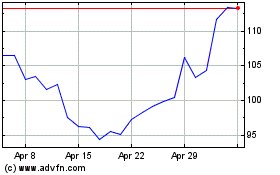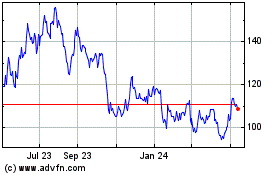China Life Insurance To Invest More Than $500 Million in Ride-Hailing Firm Didi Chuxing -- Update
June 12 2016 - 7:04PM
Dow Jones News
By Rick Carew, Douglas MacMillan and Juro Osawa
China's top life insurer is making a big investment in the
country's $25 billion homegrown competitor to Uber Technologies
Inc., despite already investing in Uber's China operation,
according to people familiar with the situation.
China Life Insurance Co. is plowing more than $500 million into
Didi Chuxing Technology Co., after Apple Inc. made a $1 billion
investment in the firm, China's biggest ride-sharing company,
according to one of the people.
Didi has been raising money from investors for a monster
financing round that would top $3.5 billion, including the China
Life and Apple money, and would value the company at more than $25
billion.
As the two biggest ride-hailing companies scour the globe for
capital, a few of the same investors are putting money into both
companies.
China Life, which is a state-owned insurer, previously has
invested in UberChina, the independent entity set up by San
Francisco-based Uber last year.
China-based investment firm Hillhouse Capital Group was an early
investor in Didi but also led a convertible bond deal to invest in
Uber's global operations. Similarly, Tiger Global Management LLC
has backed Didi in China and cut a deal in December for an
investment in Uber's global operations.
Competing startups dislike overlapping shareholder bases because
they often share confidential strategy and financial results with
investors. It is unclear what arrangements Didi and Uber have made
for those investors.
The battle for global investment allies has only intensified in
recent months. Uber raised $3.5 billion from the investment arm of
Saudi Arabia earlier this month as part of a $5 billion financing
round, the largest to date raised by a private, venture-backed
company.
Two of Didi's largest existing investors, online shopping
company Alibaba Group Holding Ltd. and social network company
Tencent Holdings Ltd., are boosting their investment in this latest
round, the people said.
Didi's $25 billion-plus valuation is more than three times as
large as that of UberChina, which has been valued at over $8
billion by investors. But Didi is still dwarfed by San
Francisco-based Uber, which recently was valued at nearly $68
billion.
While Uber continues its global expansion, Didi has forged
alliances with other ride-sharing companies around the world that
compete against Uber. Didi has, for example, invested in U.S.
ride-hailing firm Lyft Inc. and Singapore-based GrabTaxi Holdings
Pte.
China is a crucial market for Uber, as it pours billions of
dollars into expanding there. It has also run into the greatest
competition in that country from Didi, which was formed last year
by the merger of two rival Chinese taxi-hailing apps. Today, Didi
not only has a larger share of China's private car-sharing market
than Uber, but also dominates the taxi-hailing segment. The two
companies disagreed on their market-share figures.
Liu Zhen, senior vice president of strategy at Uber's Chinese
unit, said earlier this month that part of Uber's new funds raised
from Saudi Arabia's investment arm will flow into its China
operations.
Meanwhile, Uber and Didi both have strategic investors in China
that can help broaden their reach.
Internet company Baidu Inc., for example, is an investor in
UberChina, which lets hundreds of millions of users of Baidu's
popular mobile-map app to hail an Uber ride. Didi, on the other
hand, has been working closely with Tencent, operator of the
popular WeChat messaging application whose 762 million monthly
active users are predominantly in China. WeChat comes with a
ride-hailing button that directs its users to Didi's services.
Write to Rick Carew at rick.carew@wsj.com, Douglas MacMillan at
douglas.macmillan@wsj.com and Juro Osawa at juro.osawa@wsj.com
(END) Dow Jones Newswires
June 12, 2016 18:49 ET (22:49 GMT)
Copyright (c) 2016 Dow Jones & Company, Inc.
Baidu (NASDAQ:BIDU)
Historical Stock Chart
From Mar 2024 to Apr 2024

Baidu (NASDAQ:BIDU)
Historical Stock Chart
From Apr 2023 to Apr 2024
